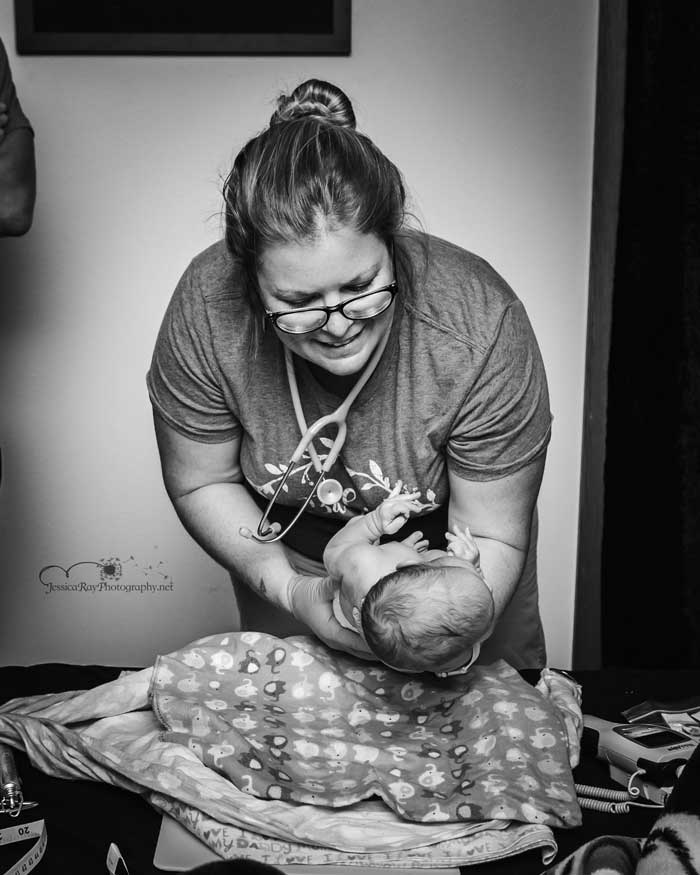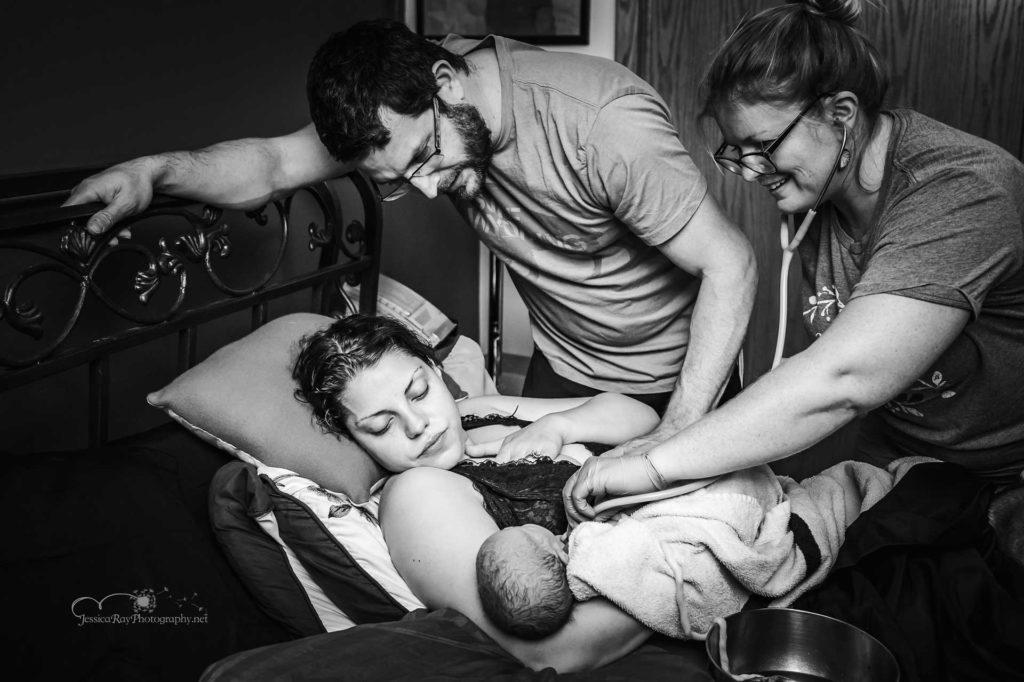Interested in learning more about home births? An at-home birth can provide peace of mind for expecting parents. Cassie Applegate runs Appletree Midwifery, servicing the Black Hills and parts of Wyoming. With an office in the heart of Rapid City, Cassie is one of only two nurse midwives doing home births in South Dakota, and the only home birth nurse midwife in western South Dakota.
A graduate of SDSU, Cassie is a Spearfish native backed by 10 years of nursing experience. In 2014 she became a certified nurse midwife (CNM), graduating from Frontier Nursing University. At that time, she and her husband were living in Denver. They returned to the Black Hills in 2016 so Cassie’s knowledge and experience could benefit area mothers and parents.


Perks of Home Birth
In the end it’s the mother’s choice, but an at-home birth can be more comfortable and reassuring for many women. With two kids and one more on the way, Joni and Karl Anderson knew that home birthing was the best route for them. Having never been in a hospital for anything before, Joni says she was nervous about being in an environment that was unfamiliar to her. “Home birthing seemed a lot more relaxing because I would be surrounded by people I knew personally, I wouldn’t have interruptions from nurses through the process, and we would know our birth team,” Joni says.
One of the benefits that women like most about home birthing is fewer interventions in a familiar space. “Essentially, we bring the hospital room to you,” Cassie shares. “Instead of you having to go to the hospital where you are cooperating with new nurses for the first time, a nurse midwife is going to be there every step of the way. We are basically Advanced Practice Nurses that specialize in pregnancy, labor, birth, and newborns.”
The most common home birthing technique is a water birth. “Instead of an epidural, mothers can enjoy an ‘aquadural,’” Cassie jokes. The majority of women are in the tub at some point during the process. Water births offer weight relief, less-painful contractions, and allow you to get into any position that feels natural and comfortable for you.
After your baby is born, nurse midwives can care for and coach the parents and newborn for up to six weeks. If the mother is struggling with breastfeeding, postpartum depression, or any complications, additional visits can be added to help track that. Cassie says, “Typically, when mothers are discharged from the hospital they aren’t seen until six weeks later.”
Joni recommends doing research as home birthing might not be for everyone. However, she adds if you are anxious about hospitals or want to feel more in control of the birthing process, home births are definitely worth considering. “With a healthy pregnancy, I was able to control my own environment. I am able to walk around the neighborhood or my home, eat whatever I want, listen to whatever music, and after the birth, my husband and I were able to go to our own bedroom and rest together as a family.” Joni and Karl share that the whole experience is blissful and relaxing, and their birthing team has always been great to work with. “They even made us a snack and then left unobtrusively,” she smiles.
Written by Sarah Richards


Nurse Midwife or Professional Midwife?
Home birthing has been available in South Dakota for more than 30 years, and advocates have had notable successes in the last few years. Approximately three years ago, CNMs were allowed to begin practicing midwifery without a physician signing a collaborative agreement, enabling them to become truly independent. In 2018, the state passed a law allowing certified professional midwives (CPM) to practice in addition to CNMs. As a CNM and registered nurse (RN), Cassie says, “The more, the merrier! South Dakota is lacking in midwives, but there are big differences between where we can practice.” CPMs can only practice at home or in a birth center, and have limited medical/nursing training.
Other Things you Need to Know
- Budget: Parents should budget between $4,000 and $5,000 when hiring a midwife. These costs cover all prenatal and postpartum sessions, as well as the labor and delivery. Most midwives don’t accept health insurance. There are some cost-sharing programs that may be able to help (e.g., Samaritan Ministries). Don’t get discouraged.
- Emergencies: If at any point during pregnancy the mother or baby presents high-risk, you may be “risked-out” of the home birth practice. While they don’t have any operating rooms or NICU support during a home birth and an emergency may not present itself until labor, CNMs have extensive training and medical equipment on hand. Cassie says, “Nurse midwives are neonatal resuscitation certified. We bring a lot of equipment and medical supplies to your house, and I’ve taken an Advanced Life Support for Obstetrics (ALSO) course. We bring oxygen, resuscitation equipment (for mom and baby), IV supplies and fluids, sutures, lidocaine, medications for mom and baby, any necessary instruments for birth, suction, basically anything they would have in a hospital room.”
Note: Usually they don’t use most of the equipment, but they have it on hand if something does take an unexpected turn, she adds. Did you know that about one in four babies are born with their umbilical cord wrapped around their neck? While it is very scary to see, this is actually fairly normal, and nurse midwives are ready for it. - Doula vs. Midwife: A doula is more like a birthing coach, someone who will be present during the labor and birth to help support the mother in any way they can. If you need water or a massage, they’ll be there for you. A nurse-midwife is a medical provider who can prescribe medication and order ultrasounds and lab work when needed. Joni says her husband advocates for having a doula present in addition to a midwife during the pregnancy. “Karl wants to be able to support me through the process, and our doula is able to show him what he can do to support and help me through it,” she adds. “The midwife is there to make sure that everything goes well physically and medically, and a doula is there for emotional comfort and mental support.”
COVID-19 Message (April 2020): Your prenatal visits may look a little different now with the coronavirus in our midst. It is hard as midwives to adapt to the times because we want to hug, and touch more, and show you our smiles. But, in an effort to protect you and ourselves we have been wearing masks at each visit and cleaning thoroughly between visits. We are also amending our prenatal visit schedule to reduce your risk of exposure in our office, per the most recent guidelines. We are also trying to become as educated as possible about how to do home birth during this time and how we will clean our equipment and reduce exposure to you when we come into your home and when we leave. Please know we have your best interests in mind. We will get through this together and continue to have happy and healthy births. Much love, Cassie
Visit Apple Tree Midwifery on Facebook to find recent information.

